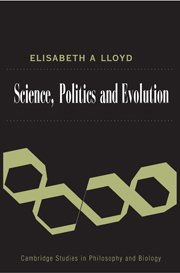Book contents
- Frontmatter
- Contents
- 1 The Nature of Darwin's Support for the Theory of Natural Selection
- 2 A Semantic Approach to the Structure of Population Genetics
- 3 Confirmation of Ecological and Evolutionary Models
- 4 Units and Levels of Selection
- 5 Species Selections on Variability
- 6 An Open Letter to Elliott Sober and David Sloan Wilson, Regarding Their Book, Unto Others: The Evolution and Psychology of Unselfish Behavior
- 7 Problems with Pluralism
- 8 Normality and Variation: The Human Genome Project and the Ideal Human Type
- 9 Evolutionary Psychology: The Burdens of Proof
- 10 Objectivity and the Double Standard for Feminist Epistemologies
- 11 Science and Anti-Science: Objectivity and Its Real Enemies
- 12 Pre-Theoretical Assumptions in Evolutionary Explanations of Female Sexuality
- References
- Index
3 - Confirmation of Ecological and Evolutionary Models
Published online by Cambridge University Press: 27 February 2010
- Frontmatter
- Contents
- 1 The Nature of Darwin's Support for the Theory of Natural Selection
- 2 A Semantic Approach to the Structure of Population Genetics
- 3 Confirmation of Ecological and Evolutionary Models
- 4 Units and Levels of Selection
- 5 Species Selections on Variability
- 6 An Open Letter to Elliott Sober and David Sloan Wilson, Regarding Their Book, Unto Others: The Evolution and Psychology of Unselfish Behavior
- 7 Problems with Pluralism
- 8 Normality and Variation: The Human Genome Project and the Ideal Human Type
- 9 Evolutionary Psychology: The Burdens of Proof
- 10 Objectivity and the Double Standard for Feminist Epistemologies
- 11 Science and Anti-Science: Objectivity and Its Real Enemies
- 12 Pre-Theoretical Assumptions in Evolutionary Explanations of Female Sexuality
- References
- Index
Summary
INTRODUCTION
This paper concerns hypothesis testing and confirmation in evolutionary and ecological theory. I outline specific criteria used in evaluating evidence for theories, and demonstrate the use of each criterion through examples from various branches of evolutionary biology and ecology. The philosophical discussions in Roughgarden (1983), Strong (1983), Simberloff (1983), and Quinn and Dunham (1983), which focus on a Popperian approach to theory testing and acceptance, present some important issues in the testing of evolutionary and ecological explanations. I find that imprecision of criteria of testing and confirmation is the weakest point in these discussions. As an alternative to a Popperian approach (as defended by, e.g., Simberloff 1983), and to other approaches commonly cited by biologists (e.g., J. Platt's “strong inference”), I suggest a new description of confirmation that includes a detailed classification of the ways in which a theory may be confirmed (see, e.g., Oster and Wilson 1978 for an endorsement of Platt's 1964 paper).
Roughgarden (1983) proposes that one establishes an empirical fact in science “by building a convincing case for that fact.” What counts as a convincing case depends, according to Roughgarden, on “common sense and experience” (pp. 583–584).
As Strong (1983) rightly points out, the appeal to common sense is problematic; common sense may not be “common” to all scientists concerned, and it says nothing about testing.
- Type
- Chapter
- Information
- Science, Politics, and Evolution , pp. 43 - 58Publisher: Cambridge University PressPrint publication year: 2008



